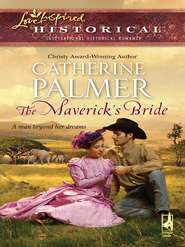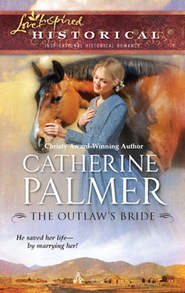По всем вопросам обращайтесь на: info@litportal.ru
(©) 2003-2024.
✖
The Gunman's Bride
Настройки чтения
Размер шрифта
Высота строк
Поля
Nerves jangling, she laced her boots and pinned her hair up in a thick, glossy knot. There had been a time when a lady’s maid had helped her dress in silk and velvet gowns, pretty slippers and kid gloves. Necklaces and bracelets that sparkled with gems had adorned her as she called on ladies of her social circle.
Now she wouldn’t trade her black-and-white Harvey Girl uniform for all the lace, ruffles and taffeta in Kansas City.
“Uniform inspection!” Mrs. Jensen called in the hallway.
Heart thumping, Rosie flew to the bed where Bart lay. “Now don’t do anything foolish,” she whispered, smoothing the sheet over his chest as though he were a sick child and not a gunslinger. “I’ll come back after the last breakfast train, so just—”
“My beautiful Rosie-girl,” he murmured as he caught her hand and brought it to his lips. With a gasp, she pulled away and hurried out into the hall.
Filling silver-plated urns with Fred Harvey’s famous coffee, Rosie tried not to think about the possibility that any moment Mrs. Jensen would storm into the restaurant screaming about the outlaw in Laura Kingsley’s room.
“Did you sleep all right?” Etta called from her station near a wall of windows. “I reckon that outlaw will be long gone by now.”
“If he’s smart, he will.” Rosie fretted as she folded napkins for her four assigned tables. “Of course, if he was smart, he never would have gotten himself shot in the first place. We’ll find out from Mr. Adams.”
Charles Adams, editor of The Raton Comet, boasted that his eight-page weekly never missed a good story. How shocked he would be to know that the scoop of the year lay just overhead in room seven.
“Twenty-two omelets are coming in on the eight-o’clock!” Tom Gable, the Harvey House manager, called out the food order that had been wired ahead. “Fourteen hotcakes, six biscuits and gravy, thirty-three coffees and nine milks. The train’ll be here in seven minutes!”
With a collective gasp, the five Harvey Girls rushed to finish their preparations. Rosie loved her work. Respected, protected, well paid, she couldn’t have found a better place to make a new life for herself. Once she had saved enough money, she would apply for a teaching position and buy a little house. It was a hope she had cherished for years. But she knew that at any moment, her past might catch up to her and snuff it out. A deafening whooo, and the dining-room floor began to shake. Glasses rattled. Cups wobbled. Spoons tinkled against knives. Steam billowed across the platform as the enormous black-and-silver engine of the Atchison, Topeka and Santa Fe train rolled into the depot. As the brakeman set the brakes, the train squealed in protest. Chunks of red-hot coal spilled from the firebox. Railway men rushed to stomp them out. The smell of oil and smoke enveloped the Harvey House.
Like wraiths, the passengers descended through the steam onto the platform. Their hats askew and coats not quite settled, they stretched, waved and stared at the blue sky after the long ride. Children scampered to the rails to inspect the big engine. Tails wagging, a pair of dogs known to the whole town as Tom and Griff trotted through the crowd.
Then one of the busboys stepped into the crowd and raised his large brass gong.
“Breakfast is served,” he called, giving the gong a hard whack with a stick. “Breakfast is served!” Rosie stood silently, hands behind her back, as the passengers walked into the dining room and took their seats.
The moment one table had been settled, she started around it.
“What do you care to drink this morning?” she asked. “We have coffee, milk or orange juice.”
As each patron stated a selection, Rosie quickly arranged the cups according to the code she had been taught. She hurried off to fetch the food while another girl poured beverages. Rosie could almost hear the customers marveling that the drink girl knew exactly what they had requested. It was all part of the Fred Harvey mystique, an air of magic that delighted patrons and filled the staff with pride.
While the diners were munching on apple wedges, oranges and grapes, Rosie went around her station taking orders for omelets, hotcakes or biscuits and gravy. The dining room filled with the spicy-sweet aroma that seemed to rouse the passengers even more effectively than the famous Harvey coffee did.
Standing motionless, hands behind her back and the required smile on her face, Rosie kept her eyes constantly roving her station for the slightest possible indication that she was needed by a diner. On most mornings she was so absorbed in her work that she never gave anything outside it a second thought. But knowing Bart lay upstairs in her bed, Rosie found her concentration wandering. What if he took it into his head to try to climb out the window? What if he lost his balance and fell out? She glanced uneasily through the long side windows, suddenly fully aware of the impossible situation she was in.
Outside the front of the red board-and-batten Harvey House lay a long porch, a row of widely spaced trees and the depot and train tracks. Behind the building was the small, fenced private yard for the House’s female employees, and beyond that stretched the town of Raton. Now that Rosie thought about it, how on earth could Bart ever hope to escape in broad daylight? He’d be spotted immediately.
But how could he stay in her room for the rest of the day? Someone would find out for sure. And what if his fever grew worse? She lifted her head, listening for thumps, bumps and moans.
The silence was almost worse than the anticipation of noise. What if Bart had died? She wrung her clasped hands behind her skirt. If Bart died, she would never have the chance to chew him out the way she’d always intended. On the other hand, she’d never learn exactly why he had followed her all the way from Kansas City, or how he had fallen in with Jesse James and his gang.
More important, she wouldn’t be able to tell him how miserable her life had been after he went away…how awful the prospect of marriage to Dr. Lowell had made her feel…
“All aboard!” The cry startled Rosie. Her passengers were hurrying off, leaving the table littered with coins and dirty dishes.
The moment the train pulled away, Mr. Gable bounded into the dining room. “Sixteen omelets coming in on the eight forty-five!”
Rosie scrambled to clear her tables. There was no time for worry. And no time for longing.
Along about ten o’clock, Bart felt his fever break. Bathed in sweat, his body suddenly began to cool. The hammering in his head eased. The room stopped spinning.
He could hear the sounds of clinking glasses and chatter from a dining room somewhere. The tantalizing aromas of cinnamon, bacon and freshly brewed coffee drifted up through the floorboards and swirled around his head.
Rosie was downstairs, he remembered suddenly, and this was her room. Her hairbrush lay on the table. Her clean, starched aprons hung by the door. He had found her!
But as the truth set in, Bart closed his eyes. Rosie didn’t want him. She had made him promise to leave. And all he had done was bloody up her rug and sheets, smell up her room with his old leather jacket and dusty boots and put her in a position to lose her job. Rosie would be hoping he was gone by the time she returned to her room.
No surprise there. Who would want a no-good half-breed gunman like him around anyhow?
With a grunt he pushed himself to his feet and lifted the lace curtain at her window. The town was twice as big as it had looked the night before. From Rosie’s bedroom he could see a shoe shop, a bakery, an undertaking parlor and enough saloons to keep the whole town drunk as hillbillies at a rooster fight. There was the Five-Cent Beer Saloon, the 1883 Saloon, the Mountain Monarch, the Bank Exchange, the Progressive Saloon, the Cowboy’s Exchange Saloon, the El Dorado, the Green Light, the Lone Star, the Dobe Saloon and O’Reilly’s. And those were just the ones Bart could make out.
A church or two had elbowed out some holy ground amid the saloons. A meeting hall, a hotel, a bank and a water tower near the bank showed that the town of Raton, New Mexico, meant business. The whole place swarmed with people—folks heading in and out of the hardware stores and mercentiles, a milkman stopping off at every house in town, men loading wagons with lumber from Hughes Brothers Carpenter and Building Supply and women carrying bundles out of D. W. Stevens, Dealers in General Merchandise. Wagons, carriages and horses filled the packed-dirt streets.
Bart brushed a hand across his forehead. He would never be able to climb out a second-story window unnoticed. He let the curtain drop and sagged against the sill. He would have to wait until dark to try an escape.
Before he did, he would make up for the trouble he had caused Rosie. Some of it anyhow.
“See you at one o’clock!” Rosie called to Etta, who was chatting with the new cook.
Heart thundering, Rosie swung into the kitchen and filled a plate with food. What if Bart had already gone? she wondered as she climbed the stairs. Worse—what if he was still there?
She pushed open the door. The bare-chested man leaning against her window frame looked nothing like the pale invalid she had tucked away at dawn. In the sunlight, his bronze skin gleamed. A towel hung around his neck. His hair, still damp, had been washed and combed away from his face.
For the first time Rosie fully saw what time had done to the gawky boy she once loved. From the raven eyebrows that slashed across his forehead to his burning emerald eyes, from the squared turn of his chin to the solid breadth of his chest, Bart Kingsley was all man.
Disconcerted, she focused on a makeshift clothesline that stretched across the room. Denim trousers, a torn cotton shirt and a couple of white sheets hung dripping.
“You washed,” she blurted out.
“Everything but the rug.” He straightened, and she realized that he had tucked her blanket around his waist.
“Cold water. All I had.”
“Cold water’s the best thing there is for bloodstains.” Steadying her breath, she held out the plate. “I brought you something to eat.”
“Thanks. I’m hungry. The fever broke a while back. I’d be much obliged if you’d allow me to stay until dark, Rosie.”
At that moment she would have allowed him to do almost anything he wanted. If she hadn’t known his veins ran with both white and Indian blood, Rosie might have mistaken Bart for a pure Apache. With his copper skin and long, black hair, he could pass for a mighty warrior straight out of a dime novel. But he was too tall, and his eyes were too green to deny the heritage of his English mother.
“You’d better stay put,” she said, busying herself by straightening her dressing table. “Unless you want Sheriff Bowman nabbing you first thing.”
“You reckon I should hang for my crimes, Rosie?”
“You’d have to answer that one.”
“I can tell you this. It’ll be a cold day in—” He caught himself. “I’m sorry, Rosie. Cussing’s a hard habit to break.”










